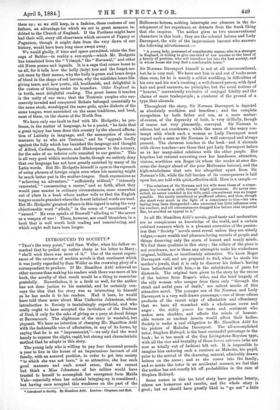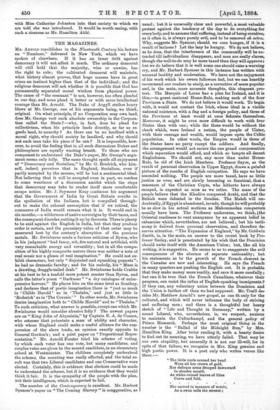INTRODUCED TO SOCIETY.*
"TEAT'S the wery point," said Sam Weller, when his father re- marked that he pulled up rather sharp in his letter to Mary ; "she'll wish there was more of it." One of the rarest experi- ences of the reviewer of modern novels is that sentiment which it was justly regarded by Sam Weller as the crowning glory of a correspondent to produce. If Mr. Hamilton Aide achieved no other success than making his readers wish there was more of his book, the novelty of that result would be a thing to remember gratefully. Nevertheless, it is a fault as well, for the author has not done justice to his material, and he certainly con- veys the idea that his story was as interesting to himself as he has made it to his readers. Had it been, he would have told them more about Miss Catherine Johnstone, whose introduction to Society is tantalisingly superficial, and who really ought to have accepted the invitation of the Duchess of Deal, if only for the sake of giving us a peep at ducal doings at Barrencourt. The slightness of the story is wasteful, but piquant. We have no intention of charging Mr. Hamilton Aide with the fashionable vice of affectation, in any of its forms, by saying that he is an "impressionist,"—we only find the word handy to express the slight, rapid, but strong and characteristic method that he adopts in this story.
The young lady who is willing to pay four thousand pounds a year to live in the house of an impecunious baronet of old family, with an assured position, in order to get into society "to which she was not born," is so attractive, she has such good manners and such sound sense, that we cannot but think a Miss Johnstone of her calibre would have trusted to herself to accomplish her emergence from Maids Vale—especially when her colonial bringing-up is considered ; but having once accepted this weakness on the part of the /straw:Er to Society. By Hamilton Aide. London : Chapman and Hall.
Melbourne heiress, nothing interrupts our pleasure in the de- velopment of her experience, or detracts from the frank liking that she inspires. The author gives us two unconventional characters in this book ; they are the colonial heiress and Lady Davenport, the wife of the impecunious baronet who answers the following advertisement
"A young lady, possessed of considerable means, who is a stranger in England, is willing to give one-third of her income to the head of a family of position, who will introduce her into the beat society, and in whose house she may find a comfortable home."
Sir Norman Davenport himself is not at all unconventional, but he is very real. We have met him in and out of books more than once, for he is merely a selfish worldling, in difficulties of his own and his son's creating; a well-dressed person, with dyed hair and good manners, no principles, but the usual notions of "honour," conveniently exclusive of conjugal fidelity and the claims of mere tradespeople ; a cumberer of the ground of a type that abounds.
Throughout the story, Sir Norman Davenport is depicted as absolutely worthless and heartless ; and the complete recognition by both father and son, as a mere matter- of-course, of the depravity of both, is very skilfully, though of course not very pleasantly, conveyed. Sir Norman is odious, but not overdrawn ; while the sense of the weary con- tempt with which such a woman as Lady Davenport must regard such a man as Sir Norman is well conveyed and always present. The cleverest touches in the book—and it abounds with clever touches—are those that put Lady Davenport before us in her many-sided relations with the other people. Her hopeless but reticent sorrowing over her handsome, attractive, vicious, worthless son Roger (in whom the reader at once dis- cerns the danger ahead of the poor Melbourne heiress), and the high-mindedness that sets her altogether apart from Sir Norman's life, while the fall burden of its consequences is laid upon her, are told with quiet, effective skill. Here is a sample :—
"The relations of Sir Norman and his wife were those of a scape- grace boy towards a mild, though frigid governess. He never con- sulted, he never confided in his wife, until concealment was no longer possible. She rarely interfered or proffered advice, and thus, though she stood very much in the light of a conscience to him—his own having long been disregarded—she exercised but little influence over his conduct, and till circumstances dragged him before that impartial Bar, he avoided an appeal to it."
In all Mr. Hamilton Aide's novels, good-taste and moderation are as conspicuous as knowledge of the world, and a certain subdued romance which is a pleasant corrective of the pessim- ism that " Society " novels must reveal unless they are utterly vulgar,—mere wealth and pleasure-loving records of people and things deserving only the scorn of honest and manly minds.
We find these qualities in this story ; the villain of the piece is not overdrawn, nor is there any attempt to make his wickedness original, brilliant, or inordinately attractive. We know Roger Davenport well, and are prepared to find, when he steals his mother's jewels, that it is only to discover his father's having
been beforehand with him,—in the substitution of paste for diamonds. The original turn given to the story by the rescue of the heiress from Roger's wiles, and the brief tragedy of the silly woman who escapes from them only "through the strait and awful pass of death," are salient merits of this attractive novel. The younger son of Sir Norman and Lady Davenport is a very well-drawn personage,—one of those odious products of the recent reign of affectation and effeminacy that we have all remarked with a wholesome scorn and anger ; the sickly poseur for taste and sentiment who makes men shudder, and affects the minds of honour- able women as unclean insects would affect their bodies. Society is under a real obligation to Mr. Hamilton Aide for his picture of Malcolm Davenport. The all-accomplished tutor, Stephen Holroyd, is the least successful personage in the book ; he is too much of the Guy Livingstone-Royston type, with all the vice and brutality of those beaux sabreurs (who are now so totally out of fashion) left out. It is impossible to imagine him enduring such a creature as Malcolm, his pupil, prior to the arrival of the charming, natural, admirably drawn heiress on the scene ; and as she comes into the family, and so meets the tutor in an accidental manner, we feel that the author has not exactly hit off probabilities in the case of Stephen Holroyd.
Some scenes in this too brief story have genuine beauty, others are humorous and caustic, and the whole story is good; but we should have greatly liked to "go out" a little
with Miss Catherine Johnston into that society to which we are told she was introduced. It would be worth seeing, with such a cicerone as Mr. Hamilton Aide.















































 Previous page
Previous page